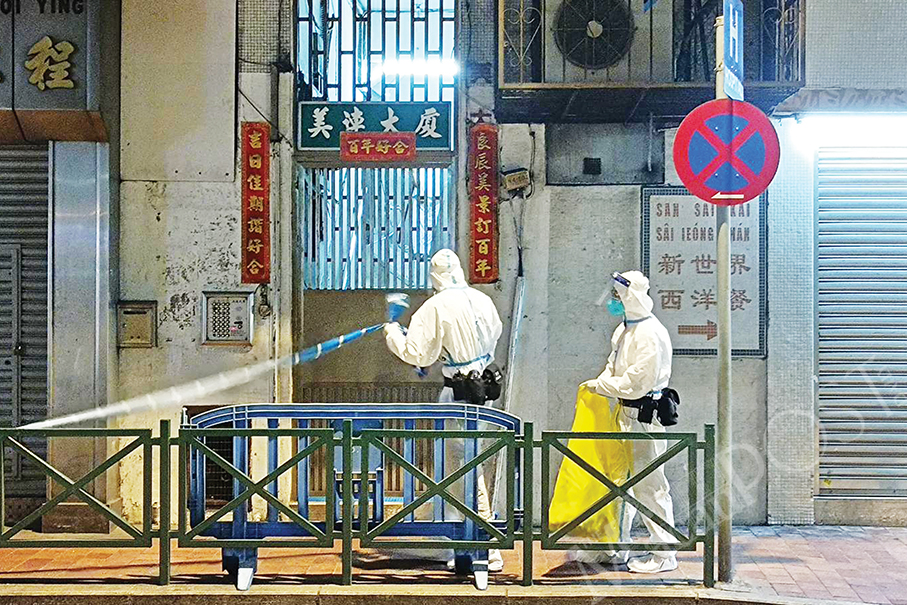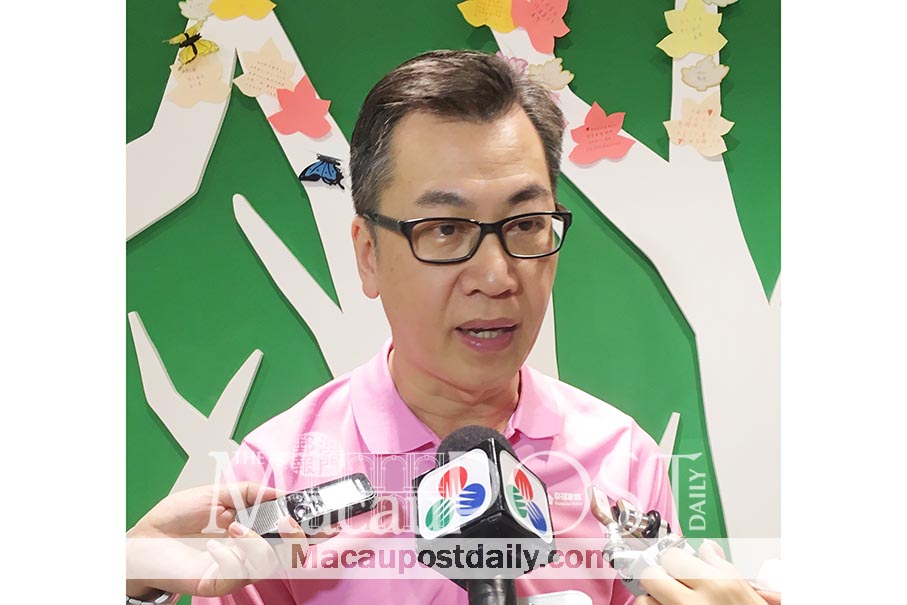Addressing yesterday’s press conference about Macau’s novel coronavirus situation, Tai Wa Hou, a clinical director of the public Conde de São Januário Hospital Centre, reaffirmed that for the time being the Macau government will not study the possible lifting of its entry ban on foreign nationals without a Macau ID card, as Macau’s COVID-19 vaccination rate has just reached around 45 percent, which he said was still much lower than is required for Macau to achieve herd immunity.
Tai was quick to add that the city has just gone through a COVID-19 incident – which started early this month when a Delta variant four-member family cluster was confirmed.
Tai said an important task for the government is to boost the city’s vaccination rate, adding that only after COVID-19 herd immunity is achieved would Macau have “confidence” in again allowing foreigners without the right of residency here to enter the city.
The Health Bureau (SSM) had previously said that Macau would need to reach a vaccination rate of at least 70 percent of the population in order to achieve COVID-19 herd immunity. However, the bureau said last month that due to the respective efficacy rates of 80 percent and 95 percent of the Sinopharm inactivated vaccine and BioNTech mRNA vaccine (the two types of COVID-19 vaccines currently available in Macau), Macau would need to reach an inoculation rate of at least 80 percent of the population in order to achieve COVID-19 herd immunity.
Tai said that as of 4 p.m. yesterday, 565,105 doses of COVID-19 vaccine had been administered to 311,761 people in Macau, comprising 56,578 who had received their first jab and 255,183 who had received their second jab.
Macau’s COVID-19 vaccination rate stood at 45.7 percent as of 4 p.m. yesterday – i.e. about 45 percent of the population has received at least one jab. According to the latest demographic statistics, Macau’s population stood at 682,500 at the end of June.
A total of 16 adverse events were reported in the past 24 hours (until 4 p.m. yesterday). The total number of adverse events since the start of the vaccination drive stood at 2,365, or 0.42 percent of the total number of jabs, including eight serious cases.
Due to the COVID-19 pandemic, foreign nationals without a Macau ID card have, in general, been barred from entering Macau since March last year, regardless of where they have been before their intended entry into Macau and whether they are willing to undergo hotel quarantine in Macau.
Only in exceptional cases can foreign nationals without a Macau ID card apply to enter Macau such as for family reunion or certain other special reasons, as long as they have not been in any countries or regions outside the mainland or Macau in the 21 days prior to their entry into Macau.
Mainland, Hong Kong and Taiwan compatriots who have been to a foreign country within 21 days prior to their intended entry into Macau are also barred from entering the city. Macau residents, including foreign nationals holding a Macau ID card, are allowed to return to Macau from a foreign country, but have to undergo hotel quarantine for at least 21 days.
‘Not a good time’
During yesterday’s press conference, a reporter asked whether the Macau government has a timetable as to when it would lift its entry ban on foreign nationals without a Macau ID card.
Tai replied that “now is still not a good time” for the government to lift its entry ban on foreign nationals without the right of residency here.
“We have now just stabilised [Macau’s COVID-19 situation] after having gone through a new round of the epidemic,” Tai said.
“Firstly, for the time being we are not 100 percent sure whether the community is safe [from COVID-19]. We have an important task, which is to detect possible COVID-19 carriers in the community early,” Tai said.
“Secondly, our vaccination rate has only reached 45 percent so far, which is far lower than herd immunity,” Tai said.
“More important for us is to raise our vaccination rate among the population as soon as possible in order to build an immunity barrier in our community as soon as possible, only in which case would we have confidence and self-confidence to again allow foreigners to enter the city. For the time being we do not have any plan to allow foreigners [without the right of residency] to enter Macau,” Tai said.
No second round of mass testing
Meanwhile, Tai also reaffirmed that for the time being the government does not plan to launch a second round of mass nucleic acid tests (NATs) as it is “confident” that there are no hidden COVID-19 carriers in the community as Macau has not recorded a new local COVID-19 case for 14 consecutive days after the four-member family cluster was confirmed early this month.
The government launched a three-day mass NAT drive on August 4 after Macau confirmed four COVID-19 cases the day before, a family of four comprising a couple and their two children, a schoolboy and a schoolgirl. All of them were infected with the Delta variant. All of the 614,465 people who took part in the 72-hour citywide NAT drive early this month tested negative for COVID-19.
The 14-day lockdown of the two COVID-19 red code zones resulting from the family cluster was lifted at 00:00 today after no COVID-19 positive case had been detected as of last night among the residents living there.
Restrictions imposed on a yellow code zone which was set up following the confirmation of the family cluster were also lifted at 00:00 today.
Since the four novel coronavirus cases were confirmed two weeks ago, no COVID-19 positive cases had been detected as of last night among all those affected by the Delta variant family cluster, such as those undergoing hotel quarantine due to the COVID-19 family cluster, those living in the three zones, those who had visited either of the two red code zones, and those who had visited the same places as the four COVID-19 patients at the same times. All of them had been subject to a number of follow-up nucleic acid tests since the confirmation of the family cluster.
During yesterday evening’s press conference, Tai noted that no positive COVID-19 cases had been detected during the city’s first citywide testing early this month and among all those affected by the family cluster – as of yesterday afternoon.
“We comprehensively carried out our first mass NAT for everyone, without anyone missing. In addition, we have carried out many nucleic acid tests for each of those who had been identified by our epidemiological investigations [as having been affected by the COVID-19 family cluster], and they have been closely monitored [by the government over the past 14 days,” Tai said.
“The results of all our measures have given us confidence that there are no hidden COVID-19 cases in the community 14 days after [the four patients were confirmed early this month], because of which for the time being we do not plan to carry out a second mass NAT drive,” Tai said.
Meanwhile, Health Bureau (SSM) Control of Communicable Diseases and Surveillance of Diseases Department Coordinator Leong Iek Hou warned during yesterday’s press conference that the fact that Macau has not recorded a new local COVID-19 case for 14 consecutive days – the average and normal length of an incubation period of the novel coronavirus – does not mean that the city is now free from a COVID-19 risk. Consequently, Leong said, the government will constantly stick to strict COVID-19 prevention and control measures, urging residents not to let their guard down in novel coronavirus prevention.
Including the four-member family cluster, Macau has recorded 63 COVID-19 cases since January 22 last year.
2 more COVID-19 patients discharged
Before the four latest cases, Macau’s total of 59 COVID-19 cases comprised 57 imported cases and two cases connected to imported ones.
The Health Bureau has classified the case of the Delta variant family’s schoolgirl as an imported case, while her three family members’ cases have been classified as “connected to imported cases”.
Consequently, the 63 cases comprise 58 imported cases and five cases connected to imported ones.
Meanwhile, Tai announced during the press conference that two more COVID-19 patients were discharged earlier yesterday, a 31-year-old local man studying in Germany who returned to Macau last month and a 21-year-old local man studying in Taiwan who returned to Macau in late May. The two have now started their recovery period isolation at the bureau’s Public Health Clinical Centre in Coloane. Their recovery period isolation will last 28 days after both tested negative for COVID-19 on Monday in their respective latest nucleic acid test.
Tai noted that after yesterday’s discharge of the two patients, only the four latest COVID-19 patients from the Delta variant family cluster are still undergoing isolation treatment.
Myocarditis case
Meanwhile, Tai announced that a 27-year-old woman who received her second BioNTech mRNA jab on Friday last week has been diagnosed with myocarditis. The case, which has been classified as a serious post-vaccination adverse event, has been transferred to the Health Bureau’s special working group tasked with assessing serious adverse events after COVID-19 vaccinations.
Myocarditis is the inflammation of the heart muscle.
The woman came down with heart palpitations on Friday last week after receiving her second BioNTech jab earlier that day, before developing chest tightness and fatigue the next day, when she also suffered hyperventilation (aka polypnoea) “after engaging in activities”, Tai said.
The woman went to the private Kiang Wu Hospital on Monday, where she was diagnosed with myocarditis, Tai said.
According to Tai, the hospitalised woman’s condition was stable yesterday.
Meanwhile, Tai also announced that the Health Bureau’s working group tasked with assessing serious post-COVID-19 vaccination adverse events has concluded that a 17-year-old boy’s myocarditis case which was reported late last month was caused by his BioNTech vaccination.
The 17-year-old boy was diagnosed with myocarditis late last month a few days after receiving his second BioNTech jab.
The World Health Organisation (WHO) has indicated the possible causal relationship between mRNA vaccinations and myocarditis, mostly occurring among young males following their second jab.
Tai said yesterday that the working group has confirmed the causal relationship between the boy’s myocarditis and his second mRNA vaccination.
Tai also underlined that myocarditis caused by mRNA vaccinations normally has minor symptoms than myocarditis resulting from its typical clinical causes. Tai said that normally those with myocarditis following mRNA vaccinations would quickly and fully recover after resting and receiving medication. Tai underlined that the Health Bureau has advised BioNTech vaccinees to avoid intensive exercises and to rest more often within a week after receiving their jabs.

Two police officers wearing protective gear remove police tape outside Mei Lin Building in Rua de Coelho do Amaral late last night when its 14-day lockdown was lifted. Photo: MPDG
Health Bureau (SSM) Control of Communicable Diseases and Surveillance of Diseases Department Coordinator Leong Iek Hou (left) speaks during yesterday’s press conference about the city’s novel coronavirus (COVID-19) situation, as Tai Wai Hou, one of the three clinical directors of the public Conde de São Januário Hospital Centre, looks on. Photo: Tony Wong







